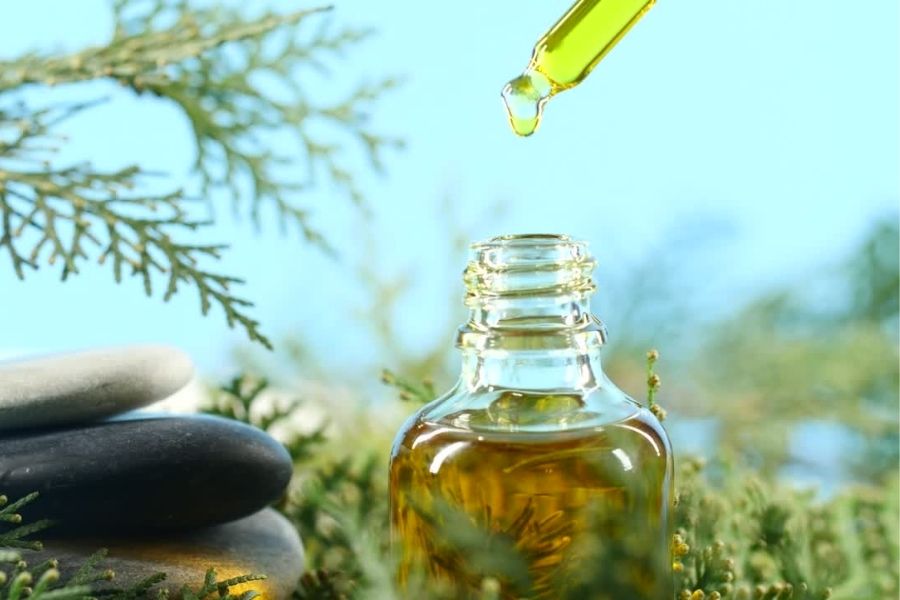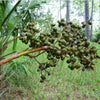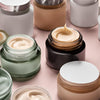Polyunsaturated Fats in Skincare: Science Facts or Myth

Polyunsaturated Fatty Acids in Skincare: Science Fact or Myth
In the world of skincare, polyunsaturated fatty acids (PUFAs} seems to be controversial. PUFA is the most abundant polyunsaturated fatty acid that is found in human skin. These fatty acids, found in popular nut and seed oils like almond, rosehip, sunflower, and others, have been the topic of much debate. Some claim that PUFAs are unstable and dangerous, while others insist that they're vital to healthy skin. So, what's the truth? Today, we'll dive into the science behind PUFAs in skincare, so that you can make an informed decision for yourself.
Let's Begin!
It's interesting to note that the sebum our skin produces naturally contains PUFA. It's true! PUFA is a vital part of human sebum and is essential for other processes in the body, as well as cholesterol, wax esters, and squalene, which make up between 15-30% of human sebum, to synthetize.
According to Dermato Endocrinology's science journal on sebaceous gland lipids,
"decreased concentration of linoleic acid has been observed in skin surface lipids of acne patients. In particular, its level has been found significantly reduced in wax esters making it reasonable to assume that linoleic acid is directly involved in the sebaceous lipid synthesis."
It has been proven that certain skin "types" that have inadequate amounts of PUFA, specifically linoleic acid can result in imbalances and symptoms such as acne, which we will discuss further.
Understanding PUFA and Their Role in Skin Health: Why is Avoiding Them Recommended by Some?
Polyunsaturated Fatty Acids in Skincare: Examining the Argument
The debate surrounding the use of polyunsaturated fatty acids (PUFA) in skincare largely revolves around one key issue: oxidation. Critics of PUFA maintain that they oxidize rapidly, leading to oxidative stress, inflammation, free radical harm, and ultimately, skin aging. So, are they accurate? Well, anything in excess can be an issue..
Scientifically speaking, the "oxidation and degradation" of PUFA in human sebum plays a significant role in initiating a chain of events that gives sebum its powerful anti-microbial properties. Therefore, is the oxidation of PUFA always considered harmful? Not really.
Keep in mind that everything, even humans, degrade over time and polyunsaturated fatty acids are no different. The reason we don't look 17 when we reach 45 is the gradual degrading of the body components.
The Importance of Stable Plant Oils for Skincare
When it comes to skincare, it's crucial to consider the stability of plant oils and their impact on your skin. Polyunsaturated fatty acids (PUFA) found in these oils are less stable than saturated fatty acids, which means they oxidize more quickly especially when exposed to air, light, heat, and free radicals. Identifying oxidized oils is relatively easy – they can change color and emit an unappealing odor. It's essential to ensure the oils you use are stable to promote healthy skin.
Should you reject the benefits of a wonderful plant oil because it oxidizes quickly? Let's apply that same logic to aging. Because someone will age, should we disregard their PRIME years since they will eventually age?

Don't Worry - Your Oil Won't Necessarily Oxidize Quickly
While it's true that some oils can oxidize faster than others, there are plenty of ways to avoid this problem. Here are a few tips to help prevent or delay oxidation:
- Incorporate a potent antioxidant like vitamin E into the oil.
- Keep the oil in a glass container that minimizes UV exposure (such as miron glass).
- Store the oil in a cool environment (like the fridge).
- Use an airless mechanism or pump instead of a dropper.
- Make sure the oil is fresh and has been processed in a manner that preserves its nutrients (such as using CO2 extraction or avoiding heat).
Understanding the Benefits and Risks of PUFA-Containing Skincare Products
It is true that there is a risk of oxidation when it comes to skincare products containing polyunsaturated fatty acids (PUFA). It is always important to purchase these products from reputable brands rather than cheaper alternatives. However, it is worth noting that fresh, unrefined, and non-oxidized PUFA have scientifically-proven benefits for your skin.
Exploring the Benefits & The Science of PUFA in Skincare: A Deep Dive
There is an overwhelming amount of scientific research available on the function and mechanism of PUFA in skincare. Let's take a closer look at what the studies reveal.
The Benefits of Polyunsaturated Fatty Acids on Skin Inflammation
Countless studies have proven that polyunsaturated fatty acids (PUFAs) can effectively decrease and regulate skin inflammation. In fact, certain types of PUFAs are considered "anti-proliferative," meaning they can prevent the growth and spread of inflammation caused by harmful free radicals (such as UV rays and pollution) that our skin is exposed to on a daily basis.
The International Journal of Molecular Sciences published this:
"The skin encounters daily onslaught by exogenous stimuli. Noxious stimuli sometimes result in injuries and/or infections, leading to wound, inflammatory dermatoses, skin aging, or skin carcinogenesis. Inflammation takes place in response to these damages to the normal skin barrier."
Moreover, polyunsaturated fatty acids have exhibited significant potential in improving inflammatory skin conditions such as dermatitis, psoriasis, and acne. These acids stimulate the production of lipids that are renowned for their ability to alleviate inflammation. LA means linoleic acid.
"Omega-3 polyunsaturated fatty acids (PUFAs), particularly eicosapentaenoic acid (20:5 n-3, EPA) and docosahexaenoic acid (22:6 n-3, DHA) are a class of lipids with various biological functions. Clinical and epidemiological studies have shown the preventive and therapeutic effects of omega-3 PUFAs on a series of illnesses such as rheumatoid arthritis, heart disease, cancers, schizophrenia, and Alzheimer’s disease (Cohen and Ratledge, 2010)."
"LA has a specific and unique role in the structural integrity of the skin and in barrier function because it is as an essential constituent of ceramides. The epidermis consists of cells and a lipid-rich extracellular matrix (with 50% ceramides, 25% cholesterol and 15% free fatty acids)."
While it's true that too much of anything, including polyunsaturated fatty acids (PUFA), can lead to sensitization and inflammation, there's no need to worry. It's important to maintain a balanced skincare routine for optimal results.
Benefits of Polyunsaturated Fatty Acids in Topical Use for Anti-aging.
The use of polyunsaturated fatty acids (PUFA) in topical skincare products provides remarkable anti-aging benefits. Certain types of PUFA, for instance, promote the formation of ceramides which leads to an improved skin barrier, increase collagen production for more elastic and plump skin, and provide photoprotective properties that help to reduce UV-related skin aging. Research shows that skin lacking PUFA may have a compromised barrier, which makes it more vulnerable to premature aging.
"Moreover, we found that topical application of EPA increases the expression of extracellular matrix (ECM) proteins, such as procollagen, tropoelastin, and fibrillin-1, by increasing transformin growth factor-β (TGF-β) expression in aged human skin in vivo."

Acne and its Causes: A Look into PUFA and Sebum Production
Wondering about the root cause of acne? Studies reveal that those who are prone to acne tend to produce excess sebum and lack PUFA, specifically linoleic acid, in their natural sebum. This is significant because PUFA can inhibit inflammatory leukotrienes, which are linked to an increase in sebum production. As a result, PUFA can prevent the formation of these leukotrienes.
Reduced linoleic acid in your natural sebum lessens anti-inflammatory and anti-microbial activity. Consequently, acne-prone skin is more vulnerable to inflammatory and acne-causing agents. Paradoxically, having too much sebum may also lead to issues. However, topically applied polyunsaturated fatty acids (PUFA) can at least partially address and regulate these problems.
A diminished amount of linoleic acid has been proposed as a factor predisposing to comedones formation. Moreover, low level of linoleic acid also produces impairment of the epidermal barrier function, which might account for increased permeability of comedonal wall to inflammatory substances
Were you aware that populations with the lowest intake of polyunsaturated fatty acids (PUFA) have the highest rates of chronic acne? It's also true that people who consume fewer PUFA-rich foods, like fish and seafood, are at a considerably greater risk of developing acne. These are just a few of the many reasons why incorporating polyunsaturated fatty acids into your diet is essential for maintaining good health.
It's safe to say that the science behind it is quite clear. Polyunsaturated fats play a vital role in skincare, particularly for those whose skin lacks these fatty acids and is suffering as a result.
Additional Factors to Keep in Mind...
Points to Consider when Choosing Skincare Products
There are a few more things to think about before making a decision on skincare products. In the context of skincare, the ingredients and formulas are designed to function together. When dealing with a multi-ingredient product, it's important to take into account the other ingredients in the formula that have been carefully selected based on their specific benefits, properties, and chemical compositions. It's important to consider the entire product and formula to determine if it is the best fit for you, as the ingredients do not work in isolation. If you trust the brand's formulation and the source of their ingredients, determining the product's suitability should be a breeze!
"Plant oils have been utilized for a variety of purposes throughout history, with their integration into foods, cosmetics, and pharmaceutical products. They are now being increasingly recognized for their effects on both skin diseases and the restoration of cutaneous homeostasis."
Every oil is unique. No two plant oils are the same, meaning that chemical composition varies from plant to plant, as well as oil to oil. It's critical to trust in Mother Nature's process and not demonize any plant oil that contains PUFA. While natural ingredients come with benefits, it's also important to understand that there are potential risks, and every individual's skin and biological makeup is different. By doing the research and trusting the brands you purchase from, you can ensure that there are no issues.
"Topical applications of plant oils may have different effect on the skin according to their composition and the pathophysiological context of the skin. The composition varies by different extraction methods."
"Future studies can add to current findings to allow for better understanding of these oils, with the potential to develop dermatological treatments and skin care products using these oils."
It's essential to consider how a plant oil or product is produced. Oils that have not undergone heat treatment or refinement are the most nutrient-rich and have a slower oxidation rate because they contain more of the plant's natural antioxidants. You can distinguish fresh, unrefined oils by their vivid colors and scents – they possess an earthy quality that lower quality, refined oils lack.
Worried about PUFA in a Product? Here's What to Do/strong>
If you're uncertain or worried about the presence of PUFA in a product, you can investigate further by learning about its production. Was the oil cold-pressed or unrefined? Was the ingredient or product treated with heat at any point? Additionally, consider how it was stored - was it kept in a temperature-controlled environment? Don't hesitate to ask these questions as a consumer. You have every right to know.
"Plant oils can be obtained through various methods, but cold-pressed oils offer superior nutritional value than those that have undergone refining. This is because the heat and chemical treatments used in refining alter the oil's composition and therapeutic effects. Cold-pressed oils, on the other hand, retain their natural properties as they are not exposed to such processes."
Hopefully, we've addressed any questions you had regarding polyunsaturated fatty acids in skincare. Here at Authentic Body And Soul, we're huge fans of PUFA, particularly for oily and acne-prone skin. We take great care to source the freshest, highest-quality ingredients to ensure that your skin receives the full benefits. Does nature regard plants as medicine? You be the judge.
Some make holistic claims yet at the same time question and disregard the very holistic approach from mother nature herself. The varying plant composition for many seeds and nuts is a testament to natures dynamic offerings. Every component is deliberately placed to work synergistically for an end goal.
Sources:
https://www.ncbi.nlm.nih.gov/pmc/articles/PMC2835893/
https://www.sciencedirect.com/topics/engineering/omega-3-polyunsaturated-fatty-acid
https://www.ncbi.nlm.nih.gov/pmc/articles/PMC8308533/
https://www.sciencedirect.com/topics/engineering/epidemiological-study
https://www.sciencedirect.com/science/article/pii/S0022227520332405
https://www.ncbi.nlm.nih.gov/pmc/articles/PMC5796020/






